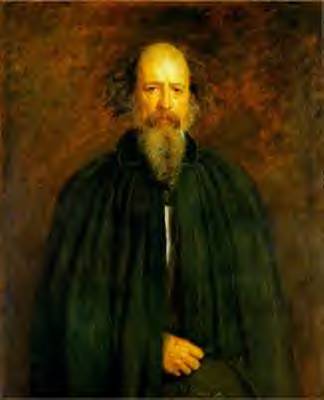Alfred,
Lord Tennyson
(1809-1892)
Alfred Tennyson is generally regarded as
the best representative of Victorian Poetry. He was born in Somersby,
Licolnshire, in England and attended Cambridge University where he joined
The Apostles, a literary club. The young men of the club would meet,
according to retired Clemson University English Literature professor Hallman
Bryant, “to smoke their pipes and discuss poetry”. At Cambridge Tennyson met
Arthur Hallam who became his best friend.
Tennyson published his first poems in
1833. His next work received bad reviews and he did not publish again for
ten years. In that tenth year his dear friend Hallam died suddenly and it
shook Tennyson. He began to write In Memorium, an ode to Hallam and one of
the finest examples of Victorian poetry. It took seventeen years to complete
this epic poem.
In 1842 his poems
The Lady of Shallot,
The Lotus Eaters and
Ulysses were published and Tennyson had solidified his
place in literary history.
A major aspect of Victorian poetry is
the “fictionalized public letter writing”. This was very brave of the
Victorian poets because the Victorian era society was said to be “scared of
it’s own shadow”; especially about opening up and expressing one’s most
inner thoughts. Victorian poetry is also “obsessed with the fictionalized
past”, “moving back in space and time, higher and beyond the conventional
experience”.
Tennyson died on October 1892 and was
buried in Poet’s Corner in Westminster Abbey.
(Quotes are
from)
-
http://www.unibuc.ro/eBooks/lls/IoanaZirra-VictorianAge/5.htm
-
http://www.onlineliterature.com/tennyson/
-
Hallman Bryant, the greatest English
Lit. Professor a student could ever have.
Since this issue is out on June
21, the first day of Summer, here is an excerpt from In Memorium as Tennyson wrote of this day:
By night we linger'd on the lawn,
For underfoot the herb was dry;
And genial warmth; and o'er the sky
The silvery haze of summer drawn;
ULYSSES
- Alfred, Lord
Tennyson
It little profits that an idle king,
By this still hearth, among these barren crags,
Matched with and aged wife, I mete and dole
Unequal laws unto a savage race,
That hoard, and sleep, and feed, and know not me.
I cannot rest from travel: I will drink
Life to the lees: all times I have enjoyed
Greatly, have suffered greatly, both with those
That loved me, and alone; on shore, and when
Through scudding drifts the rainy Hyades
Vexed the dim sea: I am become a name;
For always roaming with a hungry heart
Much have I seen and known; cities of men
And manners, climates, councils, governments,
Myself not least, but honoured of them all;
And drunk delight of battle with my peers,
Far on the ringing plains of windy Troy.
I am a part of all that I have met;
Yet all experience is an arch wherethrough
Gleams that untravelled world, whose margin fades
For ever and for ever when I move.
How dull it is to pause, to make an end,
To rust unburnished, not to shine in use!
As though to breathe were life. Life piled on life
Were all too little, and of one to me
Little remains: but every hour is saved
From that eternal silence, something more,
A bringer of new things; and vile it were
For some three suns to store and hoard myself,
And this grey spirit yearning in desire
To follow knowledge like a sinking star,
Beyond the utmost bound of human thought.
This is my son, mine own Telemachus,
To whom I leave the sceptre and the isle -
Well-loved of me, discerning to fulfil
This labour, by slow prudence to make mild
A rugged people, and through soft degrees
Subdue them to the useful and the good.
Most blameless is he, centred in the sphere
Of common duties, decent not to fail
In offices of tenderness, and pay
Meet adoration to my household gods,
When I am gone. He works his work, I mine.
There lies the port; the vessel puffs her sail:
There gloom the dark broad seas. My mariners,
Souls that have toiled, and wrought, and thought with me -
That ever with a frolic welcome took
The thunder and the sunshine, and opposed
Free hearts, free foreheads -you and I are old;
Old age hath yet his honour and his toil;
Death closes all: but something ere the end,
Some work of noble note, may yet be done,
Not unbecoming men that strove with Gods.
The lights begin to twinkle from the rocks:
The long day wanes: the slow moon climbs: the deep
Moans round with many voices. Come, my friends,
'Tis not too late to seek a newer world.
Push off, and sitting well in order smite
The sounding furrows; for my purpose holds
To sail beyond the sunset, and the baths
Of all the western stars, until I die.
It may be that the gulfs will wash us down:
It may be we shall touch the Happy Isles,
And see the great Achilles, whom we knew.
Though much is taken, much abides; and though
We are not now that strength which in old days
Moved earth and heaven; that which we are, we are;
One equal temper of heroic hearts,
Made weak by time and fate, but strong in will
To strive, to seek, to find, and not to yield
|





